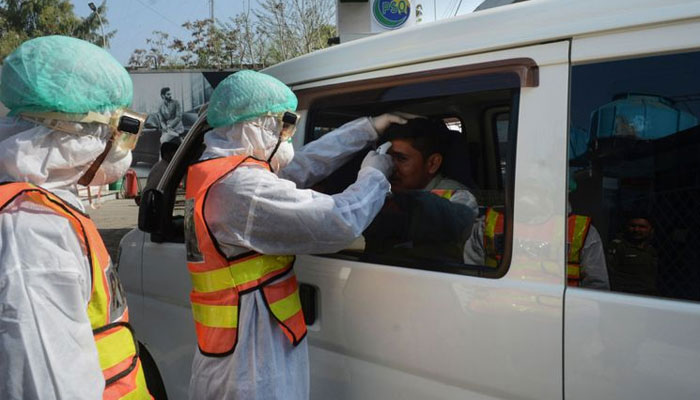Tackling COVID-19 challenge: Pakistan among least prepared countries
ISLAMABAD: How prepared is Pakistan to respond and cope with the COVID-19 crisis? The United Nations Development Program's (UNDP) latest report based on data suggests Pakistan is among those countries that are least prepared to tackle the coronavirus challenge.
Keeping in view the level of human development, healthcare system capacity and internet access, Pakistan is one of those countries that are vulnerable to Covid-19 due to lack of preparedness. For every 10,000 people, Pakistan has only 9.8 physicians, five nurses and only six hospital beds. The country spends only 2.8 percent of its GDP on health. This level of preparedness shows how vulnerable Pakistan is to this pandemic.
On the contrary, the developed countries with very high human development rankings have on average 55 hospital beds, over 30 physicians, and 81 nurses per 10,000 people. The least developed nations on average have seven hospital beds, 2.5 physicians, and six nurses.
It also highlighted the issues being faced by the people during lockdowns. The digital divide according to this report has become more significant than ever. Almost 6.5 billion people around the globe — 85.5 percent of the global population still don’t have access to reliable broadband internet, which limits people’s ability to work and continue their education.
The UNDP’s new data dashboards reveal huge disparities among countries in ability to cope with Covid-19 and recover. According to this report, shocks like COVID-19 pandemic, show the ability to respond is significantly lower and unequally distributed.
According to this data, India has 7.8 physicians for every 10,000 people whereas, it has 21 nurses and 7 hospital beds for every 10,000 persons. India spends 3.7 percent of its total GDP on health. On the contrary, a developed country like the United States has 125.9 physicians, 86 nurses and 29 hospital beds for every 10,000 people. The US spends 17.1 percent of its total GDP on health.
According to this report, the South Asian region has 7.8 physicians per 10,000 people. The region has 17 nurses and eight hospital beds for every 10,000 people.
"Although everyone is potentially affected in one way or another by this pandemic, some individuals and groups are more vulnerable, and suffer far more harm and have a much longer road to recovery. Poverty adds to the high risks of long-lasting consequences. Despite recent progress in poverty reduction, about 1 in 4 people still live in multidimensional poverty or are vulnerable to it, and more than 40 percent of the global population does not have any social protection. Globalization has brought new opportunities and efficiency gains, but, as witnessed with COVID-19 pandemic, disruptions at one point of the chain can trigger serious local problems elsewhere. The effects of such events may be detrimental for countries and people that, for example, heavily depend on tourism such as island countries, inflows of remittances, or receiving official development assistance," the report says.
-
 ‘Stingy’ Harry, Meghan Markle Crack Open A Chasm Despite Donation: ‘Do So At Your Own Peril’
‘Stingy’ Harry, Meghan Markle Crack Open A Chasm Despite Donation: ‘Do So At Your Own Peril’ -
 Research Explores How TikTok’s Recommendation System May Influence Teen Beliefs
Research Explores How TikTok’s Recommendation System May Influence Teen Beliefs -
 Google Wins Approval To Export South Korea’s High-precision Maps After 20 Years—With Strict Conditions
Google Wins Approval To Export South Korea’s High-precision Maps After 20 Years—With Strict Conditions -
 King Charles’ Health Battle: What Has Been Revealed About His Cancer So Far
King Charles’ Health Battle: What Has Been Revealed About His Cancer So Far -
 Bad Bunny Tugs At People’s Heartstrings With A Generous Act Of Love: ‘Our Staff Didn't Even Realize’
Bad Bunny Tugs At People’s Heartstrings With A Generous Act Of Love: ‘Our Staff Didn't Even Realize’ -
 Paramount Wins Warner Bros. Bidding War As Netflix Abandons Deal: Here’s Why
Paramount Wins Warner Bros. Bidding War As Netflix Abandons Deal: Here’s Why -
 Cardi B Finally Responds To Accusations About Destroying 'SNL' Set After Nicki Minaj Joke
Cardi B Finally Responds To Accusations About Destroying 'SNL' Set After Nicki Minaj Joke -
 Gorton And Denton By-election Result: Green Party Defeats Labour In Blow To Keir Starmer
Gorton And Denton By-election Result: Green Party Defeats Labour In Blow To Keir Starmer -
 Jack Dorsey Cuts 4,000 Roles, Says AI Requires Smaller Teams
Jack Dorsey Cuts 4,000 Roles, Says AI Requires Smaller Teams -
 Reggie Bannister Health Takes ‘difficult Turn’ Amid Dementia, Parkinson’s Battle
Reggie Bannister Health Takes ‘difficult Turn’ Amid Dementia, Parkinson’s Battle -
 'Humble Traitor' Rob Rausch Makes Unexpected Move After Betraying Maura Higgins In Season 4
'Humble Traitor' Rob Rausch Makes Unexpected Move After Betraying Maura Higgins In Season 4 -
 Sarah Ferguson Drops An Accusation Against Andrew? ‘He Just Wants Leverage’
Sarah Ferguson Drops An Accusation Against Andrew? ‘He Just Wants Leverage’ -
 Anthropic Rejects Pentagon Military AI Proposal, Holds Firm On Safety Guardrails —What’s Next?
Anthropic Rejects Pentagon Military AI Proposal, Holds Firm On Safety Guardrails —What’s Next? -
 'Traitors' Reunion Drama: Rob Rausch Defends Strategy, Makes Shocking Revelation After Victory
'Traitors' Reunion Drama: Rob Rausch Defends Strategy, Makes Shocking Revelation After Victory -
 Inside Hillary Clinton’s Epstein Testimony: Key Takeaways And Highlights Explained
Inside Hillary Clinton’s Epstein Testimony: Key Takeaways And Highlights Explained -
 'Too Hard To Be Without’: Woman Testifies Against Instagram And YouTube
'Too Hard To Be Without’: Woman Testifies Against Instagram And YouTube




